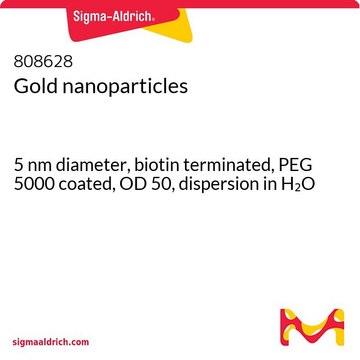752584
Gold nanoparticles
10 nm diameter, OD 1, stabilized suspension in 0.1 mM PBS, reactant free
Synonyme(s) :
Au NP, Gold colloid
About This Item
Produits recommandés
Forme
nanoparticles
suspension
Concentration
~6.0E+12 particles/mL
DO
1
Diamètre
10 nm
λmax
515-519 nm
Température de stockage
2-8°C
Chaîne SMILES
[Au]
InChI
1S/Au
Clé InChI
PCHJSUWPFVWCPO-UHFFFAOYSA-N
Vous recherchez des produits similaires ? Visite Guide de comparaison des produits
Catégories apparentées
Description générale
Application
- Development of a biophotonic fiber sensor using direct-taper and anti-taper techniques with seven-core and four-core fiber for the detection of doxorubicin in cancer treatment.: Gold nanoparticles play a crucial role in enhancing the sensitivity and precision of fiber optic sensors for detecting chemotherapy drugs, demonstrating their significant potential in medical diagnostics and pharmaceutical research (Li et al., 2024).
- Generalized ratiometric surface-enhanced Raman scattering biosensor for okadaic acid in food based on Au-triggered signal amplification.: Gold nanoparticles are utilized to amplify Raman scattering signals, improving the detection of toxins in food products, which is essential for food safety and public health research (Wei et al., 2024).
Informations légales
Code de la classe de stockage
12 - Non Combustible Liquids
Classe de danger pour l'eau (WGK)
nwg
Point d'éclair (°F)
Not applicable
Point d'éclair (°C)
Not applicable
Faites votre choix parmi les versions les plus récentes :
Déjà en possession de ce produit ?
Retrouvez la documentation relative aux produits que vous avez récemment achetés dans la Bibliothèque de documents.
Les clients ont également consulté
Articles
Steven J. Oldenburg, Ph.D. provides an overview of lateral flow diagnostic assays and discusses the use of ultra-bright reporter particles based on the unique optical properties of gold nanoshells that significantly increase the sensitivity of lateral flow immunoassays.
Sustainable, environment-friendly, and clean energy sources with sufficiently high production efficiency for practical application are highly desirable to meet the energy challenge of the 21st century due to the world′s increasing energy demand.
Gold (Au) nanoparticles have tunable optical and electronic properties and are used in a number of applications including photovoltaics, sensors, drug delivery & catalysis.
Inorganic nanomaterials are tunable by size, shape, structure, and/or composition. Advances in the synthesis of well-defined nanomaterials have enabled control over their unique optical, electronic, and chemical properties stimulating tremendous interest across a wide range of disciplines. This article illuminates some of the recent research advances of inorganic nanoparticles (NPs) in optoelectronics applications.
Notre équipe de scientifiques dispose d'une expérience dans tous les secteurs de la recherche, notamment en sciences de la vie, science des matériaux, synthèse chimique, chromatographie, analyse et dans de nombreux autres domaines..
Contacter notre Service technique




